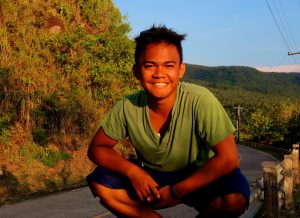Just call him a “Revolution Cultivator.”
Dalton Tiegs, a 2016 Pride Foundation Scholar, has adopted the title informally both in his work as a youth activist and organizer with Boise-based Idaho Coalition Against Sexual & Domestic Violence and in his own personal life.
“I feel like that title incorporates social change into my every day and way of life,” said Dalton, a 19-year-old gay Filipino man who moved from the Philippines to the U.S. when he was eight. Dalton graduated from high school in 2015 in Caldwell, a rural town about 30 miles west of Boise. “A part of my liberation is decolonizing and recognizing that a part of the oppressor lives within me.”
“Though I am part of the LGBTQ community, a person of color, and an immigrant, I still have tendencies that contribute to a rigid gender binary, anti-blackness culture, xenophobia, classism, and ableism,” he said. “These tendencies are not overt, and they may not be detectable, but the accumulation of prejudice over time contribute in some way to the systemic marginalization of people.”
“The title alone of being an ‘activist’ doesn’t hold me accountable in spaces where change can only occur within me,” Dalton added. “It’s an internal process. I need to be more compassionate as a person, and be more available and ready to help others as an ally, whatever their ask is of me.”
Dalton starts his sophomore year in the fall at Boise State University, where he’s studying ethnic studies and sociology. After graduating, he plans to attend graduate school and pursue Facilitative Conflict Management and Resolution.
“I am super passionate about understanding the systems in place that limit people from reaching their fullest potential,” he said. “I believe in the ability of a conversation to help people lead with their hearts instead of their minds. Ultimately, I hope my work will link progressive movements so that we can move together towards compassionate communities, where everyone reaches their fullest potential, and has the opportunity and access to the resources they need.”
Dalton already has a good start toward that goal in his work with the Coalition, originally joining as an intern in August 2014. He’s particularly proud of his contribution to the organization’s “Our Gender Revolution” campaign, directed at young people in middle school and high school to prevent gender-based violence that targets girls, women, and people who are transgender and non-conforming.
“I proposed an idea to link our existing movement with the liberators of our past: largely women of color who emphasized a collective, multi-intersectional liberation,” he said. “Our campaign is designed to initiate conversations, so a part of my job is being a conversation facilitator on youth engagement, intersectionality, and collective liberation.”
Dalton is also working with the Coalition on an Idaho LGBTQ Rural Youth Leadership Initiative—a program funded with the help of a Pride Foundation grant in December 2015—with the goal of removing barriers for LGBTQ youth in rural parts of the state and empowering them to participate in youth activism and organizing.
“We hope to train young people on utilizing their voices to organize in their communities and create a statewide network,” he said. “My role in the project has been around logistics for registration and venue coordination, though I’ve also been encouraged to take on a leadership role in the workshops that are planned for this summer and assist youth in developing them, as these workshops will largely be youth-led.”
Growing up gay and a person of color in southwest Idaho was a definite challenge and impacted his self-identity, Dalton said. He often felt he was “in a race for second place” as a minority, compounded and confused at times by also being a child with a white father with implied societal privileges.
Asked about any advice he’d offer to LGBTQ youth of color growing up in a rural community, Dalton said he does not yet feel he is experienced enough to offer words of wisdom, though he would have some thoughts to share with his younger self.
“I would tell my previous self to allow myself to be angry,” he said. “I kept anger at bay because I felt powerless if I could not do anything about a given situation. I would then tell myself to share why I was angry. It’s easy to be mad at specific entities and people, but it’s harder to process and heal when you can’t quite identify a larger system that works against you.”
Dalton said being awarded a Pride Foundation scholarship means much to him: “I am so happy to have this opportunity, and so proud to be part of the LGBTQ community and recognized for my efforts,” he said.
Steve Martin is the Regional Development Organizer in Idaho. Email Steve
